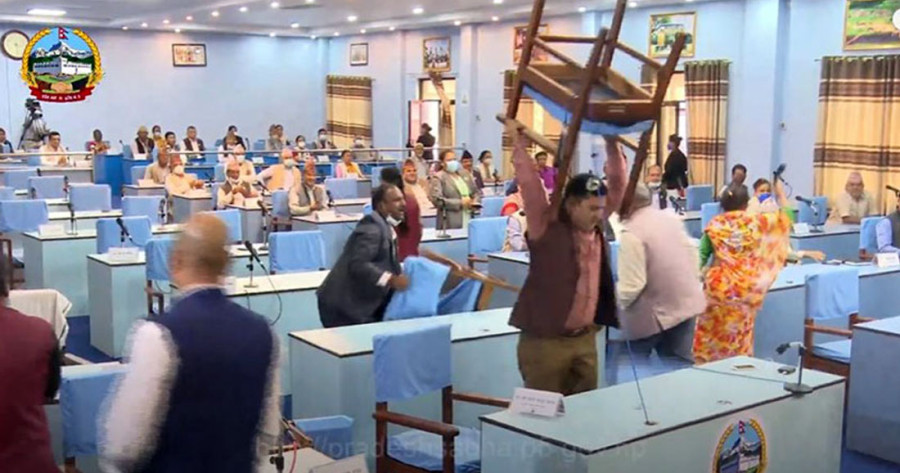Editorial
An assembly of vandals
Nepali Congress must demonstrate that a well-behaved opposition is paramount to democracy.
Five years of the constitution that transitioned Nepal into a federal democratic republic, and two and a half years since the assemblies in the seven provinces came into place, there seems to be little understanding among our elected representatives as to why they are there. What happened on Monday in the Province 5 assembly just leaves a bad taste. As a proposal to name Province 5 Lumbini and declare Deukhuri Valley as its capital was tabled in the assembly, some assembly members of the opposition party Nepali Congress resorted to vandalism. They flung their chairs and smashed them on the tables as they chanted slogans in protest.
What has so far been apparent, though, is that Nepali politicians are still refusing to commit themselves to federalism even though they are not tired of boasting that they fought hard to achieve it. Despite having people’s representatives of their own in the provinces, the central leaders still continue to bulldoze their ideas and orders on the assemblies. The ruling Nepal Communist Party chairs’ instruction to Province 5 Chief Minister Shankar Pokharel on the provincial name and capital is the root cause of this problem.
If the leaders are committed to federalism, they should allow the institutions under the federal set-up to function independently. The constitution says the name and capital of each province must be endorsed by a two-thirds vote in the respective provincial assembly. The ruling party, however, has undermined this basic constitutional provision so as to address its internal conflict and placate some leaders.
Even as a section of the Nepal Communist Party in the provincial assembly opposed the party high command’s directive on the name and capital of the province, the Nepali Congress jumped into the fray. In a democracy, any party holds the right to protest and register its dissenting views, but resorting to vandalism–that too in the hallowed chambers–is condemnable and beyond justification.
The assemblies of the elected people's representatives are the highest law-making bodies. Their role in shaping democracy and nurturing a democratic culture is immense. It’s true that they are also a forum for politics, and so the elected representatives do use them to communicate to their electorate. But that in no way means that the elected representatives can turn into hooligans. Such an act does not only undermine the assembly but also comes as disrespect to the electorate.
The constitution bestows immense power on lawmakers. As elected representatives, they are accountable to the people who voted for them. But the representatives do not seem to recognise the power they possess by which they can change things through informed debate and discourse. While Nepal’s Parliament and assemblies are turning into rubber stamps, some politicians are taking advantage of the lack of culture of disciplinary action. Vandalism, high-handedness and muscle-flexing rule the roost while debates and discourse are put on the back burner.
On Monday evening, some prominent Nepali Congress leaders, including spokesperson Bishwa Prakash Sharma and lawmaker Gagan Thapa, were quick to react on social media, condemning the vandalism perpetrated by their colleagues in the provincial assembly. As the foremost political party that fought hard to institutionalise democracy in Nepal, the Nepali Congress must tender an official—and unconditional—apology for the fiasco, take disciplinary action against its rowdy leaders, and set an example for other political parties to follow. As the main opposition party, the Congress must also lead by example in establishing that a competitive and well-behaved opposition is essential for democracy.




 18.12°C Kathmandu
18.12°C Kathmandu














